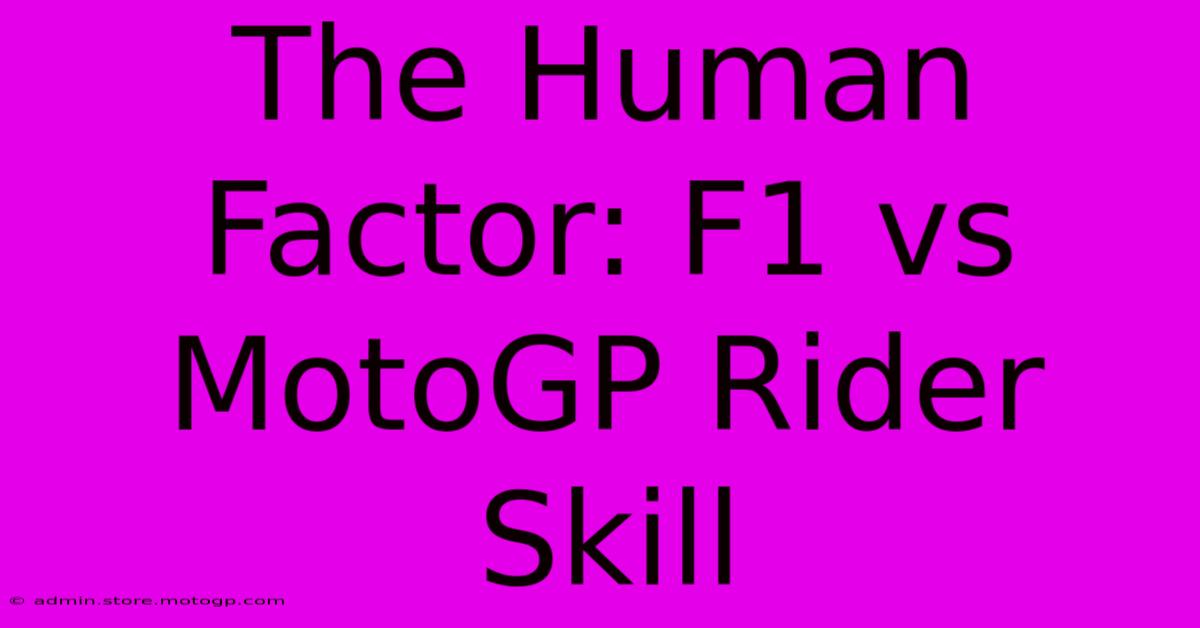The Human Factor: F1 Vs MotoGP Rider Skill

Table of Contents
The Human Factor: F1 vs MotoGP Rider Skill – A Head-to-Head Comparison
Formula 1 and MotoGP. Two of the most prestigious and demanding motorsport disciplines on the planet. Both require incredible skill, precision, and mental fortitude, but the nature of the skills required differs significantly. While both feature elite athletes pushing machines to their absolute limits, the "human factor" plays out very differently in each. This article dives deep into a comparative analysis of the distinct skill sets needed to excel in F1 and MotoGP.
The Physics of Control: Different Beasts, Different Challenges
The fundamental difference lies in the machines themselves. F1 cars are ground-effect beasts, relying heavily on aerodynamic downforce for grip and cornering speeds. MotoGP bikes, on the other hand, are inherently unstable two-wheeled vehicles relying on rider skill and tire grip to maintain balance at incredible lean angles and speeds.
F1: Precision and Calculated Risk
F1 drivers need exceptional car control, reacting to subtle changes in tire grip, aerodynamic balance, and mechanical issues. They manage complex systems through a steering wheel interface, making minute adjustments to brake bias, engine mapping, and differential settings. Strategic thinking is crucial, understanding tire degradation, fuel consumption, and race tactics. Their skill lies in precision, consistency, and managing risk within a highly controlled environment.
MotoGP: Raw Talent and Unpredictability
MotoGP riders demonstrate a different kind of precision – one honed by instinctive reaction and unparalleled physical prowess. Maintaining balance at extreme lean angles, while simultaneously braking, accelerating, and shifting gears, requires phenomenal body control and spatial awareness. The unpredictable nature of the track, weather conditions, and other riders demand lightning-fast reflexes and exceptional risk assessment. Their skillset leans towards raw talent, adaptation, and the ability to handle unforeseen circumstances.
Beyond the Machine: Physical and Mental Demands
Both disciplines demand immense physical and mental strength. However, the nature of these demands again differs significantly.
F1: G-Force Endurance and Mental Focus
F1 drivers endure high G-forces during cornering and braking, requiring significant neck and core strength. The mental demands are equally intense, requiring unwavering concentration for extended periods, managing fatigue, and making split-second decisions under immense pressure. Mental resilience and strategic thinking are paramount.
MotoGP: Stamina, Agility, and Instinctive Reaction
MotoGP riders need exceptional stamina and agility. They constantly shift their weight, fight the bike's tendency to slide, and endure significant physical stress from the vibrations and forces exerted on their bodies. Their reflexes must be razor-sharp, reacting to unexpected events and other riders. Mental toughness is crucial to manage pain, fear, and the high risk of crashes.
The Unsung Hero: Adaptability
In both F1 and MotoGP, adaptability is a critical skill. Track conditions change, mechanical issues arise, and competitors push relentlessly. The ability to adjust to these unforeseen circumstances is what separates the champions from the also-rans. Both F1 and MotoGP drivers must be able to rapidly analyze situations, adapt their strategies, and execute flawlessly under pressure.
Conclusion: Apples and Oranges, Both Exquisite
While both F1 and MotoGP require exceptional skill, the specific skill sets are distinct. F1 emphasizes precision, strategy, and car control within a more controlled environment, while MotoGP rewards raw talent, instinctive reactions, and exceptional physical prowess in a chaotic and unpredictable setting. Ultimately, both represent the pinnacle of motorsport, showcasing the incredible human potential to master complex machines and overcome extreme challenges. The debate on who possesses "greater skill" is ultimately subjective and depends on the criteria used for judgment. Both deserve immense respect and admiration.

Thank you for visiting our website wich cover about The Human Factor: F1 Vs MotoGP Rider Skill. We hope the information provided has been useful to you. Feel free to contact us if you have any questions or need further assistance. See you next time and dont miss to bookmark.
Featured Posts
-
Moto Gp Crash Today Learning From Mistakes
Feb 18, 2025
-
Austins Hottest Ticket Motorcycle Race Action
Feb 18, 2025
-
Austin Sprint Race Time Personalized Training Plans
Feb 18, 2025
-
The Power Of Motorcycle Riding Celebrated By Famous Riders
Feb 18, 2025
-
Your F1 Parking Pass Awaits
Feb 18, 2025
